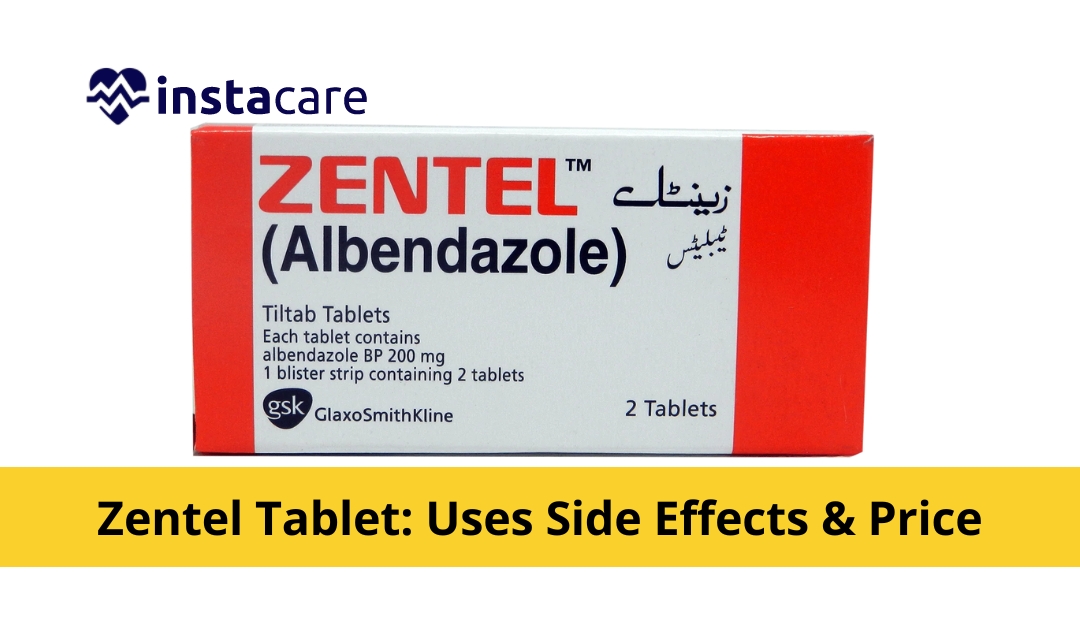Introduction
Zentel is a brand name for a tablet that contains the active ingredient albendazole, it is used to treat a variety of parasitic infections in humans. Albendazole belongs to the benzimidazole class of drugs and works by interfering with the metabolism of the parasites, which ultimately fatal.
Uses of zentel tablet
Zentel tablet containing albendazole is primarily used for
the treatment of parasitic infections in humans caused by tapeworms, roundworms,
and flukes. It also used for the treatment of other infections caused by
protozoa and helminths.
Some specific conditions that zentel can be used to treat
include:
- Neurocysticercosis: a parasitic infection of the brain
caused by the larvae of the pork tapeworm.
- Hydatid disease: a parasitic infection caused by the larvae
of the dog tapeworm, which can affect the liver, lungs, and other organs.
- Ascariasis: an enteric infection origin from roundworms.
- Hookworm infection: an enteric infection origin from
hookworms.
- Trichinellosis: a parasitic infection caused by roundworms
that can lead to muscle pain, fever, and swelling.
- Filariasis: a parasitic infection caused by thread-like
worms that can lead to swelling of the limbs and genitals.
Drug interactions
Zentel tablet containing albendazole can interact with other
drugs, including prescription medications, over-the-counter drugs, and herbal
supplements. Some of the potential drug interactions of albendazole include:
Cimetidine: taking cimetidine along with albendazole may
increase the levels of albendazole in the blood, leading to an increased risk
of side effects.
Dexamethasone: dexamethasone may decrease the effectiveness
of albendazole.
Antiepileptic drugs: some antiepileptic drugs such as
carbamazepine, phenobarbital, and phenytoin can decrease the effectiveness of
albendazole.
Warfarin: taking albendazole along with warfarin may
increase the risk of bleeding.
Herbal supplements: some herbal supplements acting as st. John's wort and ginkgo biloba can decrease the effectiveness of albendazole.
Disease interactions
Some of the potential disease interactions include:
- Liver disease: albendazole is primarily metabolized in the
liver, so patients with liver disease may be at an increased risk of side
effects.
- Bone marrow suppression: albendazole can cause bone marrow
suppression, which may be a concern for patients with anemia or other blood
disorders.
- Pregnancy: albendazole is classified as a pregnancy category
c drug, which means it may cause harm to a developing fetus. It must only be
consume during pregnancy if the possible benefits exceed the risks.
- Breastfeeding: albendazole is excreted in breast milk and
may harm a nursing baby. It is recommended to avoid breastfeeding while taking
albendazole.
- Neurocysticercosis: albendazole is commonly used to treat
neurocysticercosis, but patients with this condition may experience seizures or
other neurological symptoms during treatment.
Food interactions
There are no known food interactions with zentel tablet containing albendazole. However, it is recommended to take albendazole with food to improve its absorption and decrease the risk of side effects such as nausea and vomiting.
Additionally, it is important to avoid consuming alcohol while taking albendazole as it may increase the risk of liver damage. It is recommended to avoid alcohol during treatment and for at least 3 days after the last dose of albendazole.
View More: Angised Tablet - Uses Side Effects And Price In Pakistan
Side effects of
Some of the usual side effects of albendazole include:
- Nausea and vomiting
- Abdominal pain
- Headache
- Dizziness
- Diarrhea
- Constipation
- Skin rash or itching
- Hair loss
Less usual but more complicated side effects may include:
- Allergic reactions such as hives, difficulty breathing, and
inflammation of the face, lips, tongue, or gullet.
- Fever
- Unusual bleeding or bruising
- Vision changes
- Seizures
- Liver problems such as jaundice, dark urine, and abdominal
pain
Dosing information
The dosing information of zentel tablet containing
albendazole is as follows:
For the treatment of intestinal worms
- Adults and children over 2 years of age: the usual dose is a
single tablet (400 mg) taken orally, with or without food. Repeat the dose
after 2 weeks if necessary.
For the treatment of hydatid disease
- Adults: the recommended dose is 400 mg twice daily with
meals for 28 days, followed by a 14-day break before starting another 28-day
course of treatment.
- Children: the dose is based on body weight and is usually
10-15 mg/kg of body weight per day, divided into two doses and taken with
meals, for 28 days, followed by a 14-day break before starting another 28-day
course of treatment.
Price of
- Zentel tablet 200mg 2 tablets packet is of 35pkr
- Zentel tablet 400mg 10 tablets packet is of 80pkr Storage
Storage
Zentel tablets containing albendazole should be stored at room temperature, which is generally between 20-25°c (68-77°f). They should be kept in a dry place, away from moisture and direct sunlight.
Packaging
Zentel tablet containing albendazole is packaged in a
blister pack or strip pack. The tablets are round, biconvex, and white to
off-white in color. The blister pack or strip pack contains either 2 or 4 tablets,
with each tablet containing 400 mg of albendazole.
The blister pack or strip pack is usually labeled with the brand name, dosage strength, batch number, manufacturing date, and expiry date. The packaging also includes important information such as instructions for use, precautions, and side effects.
You can easily buy online medicine In Pakistan and get it delivered to your doorstep with InstaCare. Visit the website or call at 03171777509 for further information.

